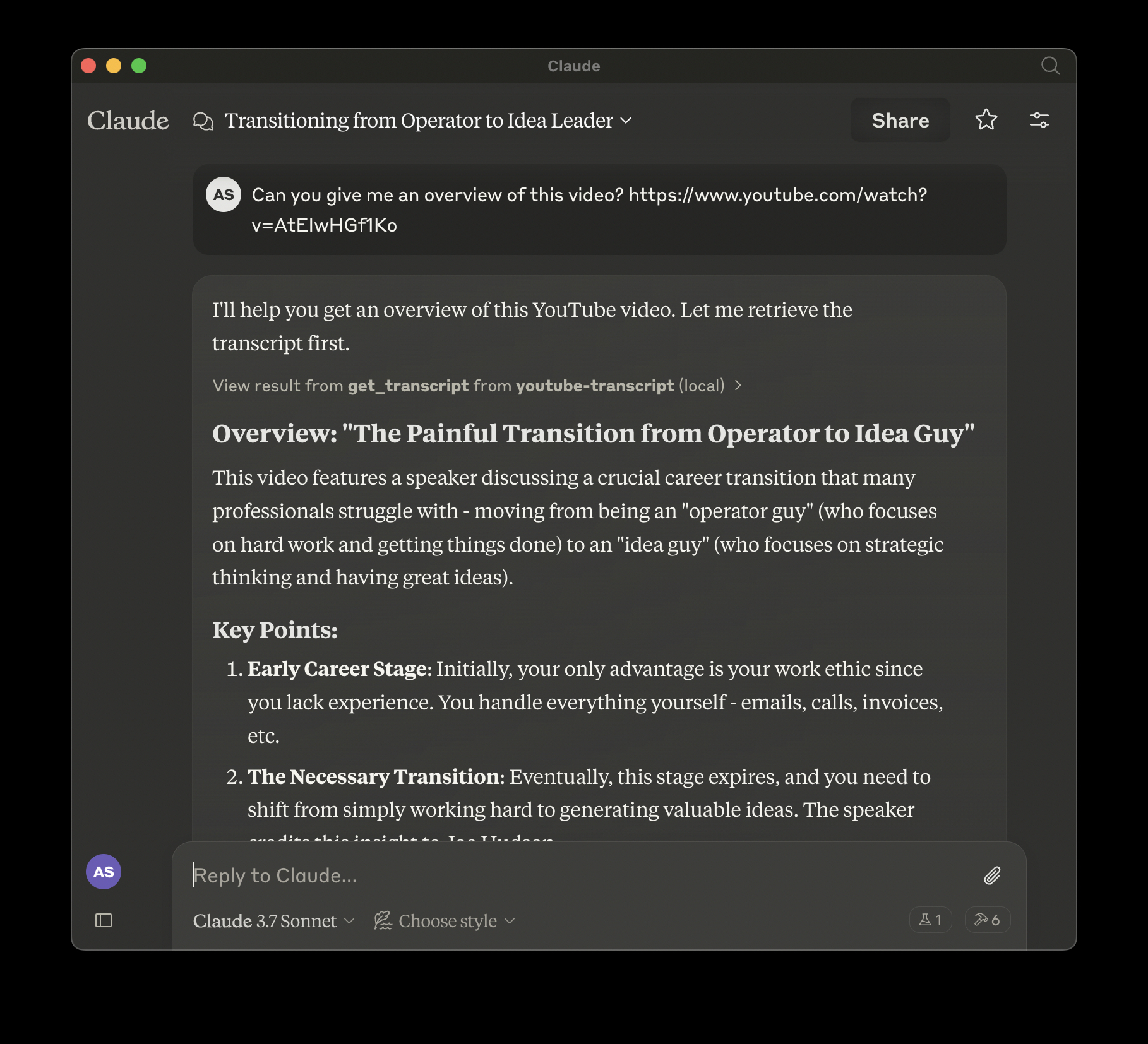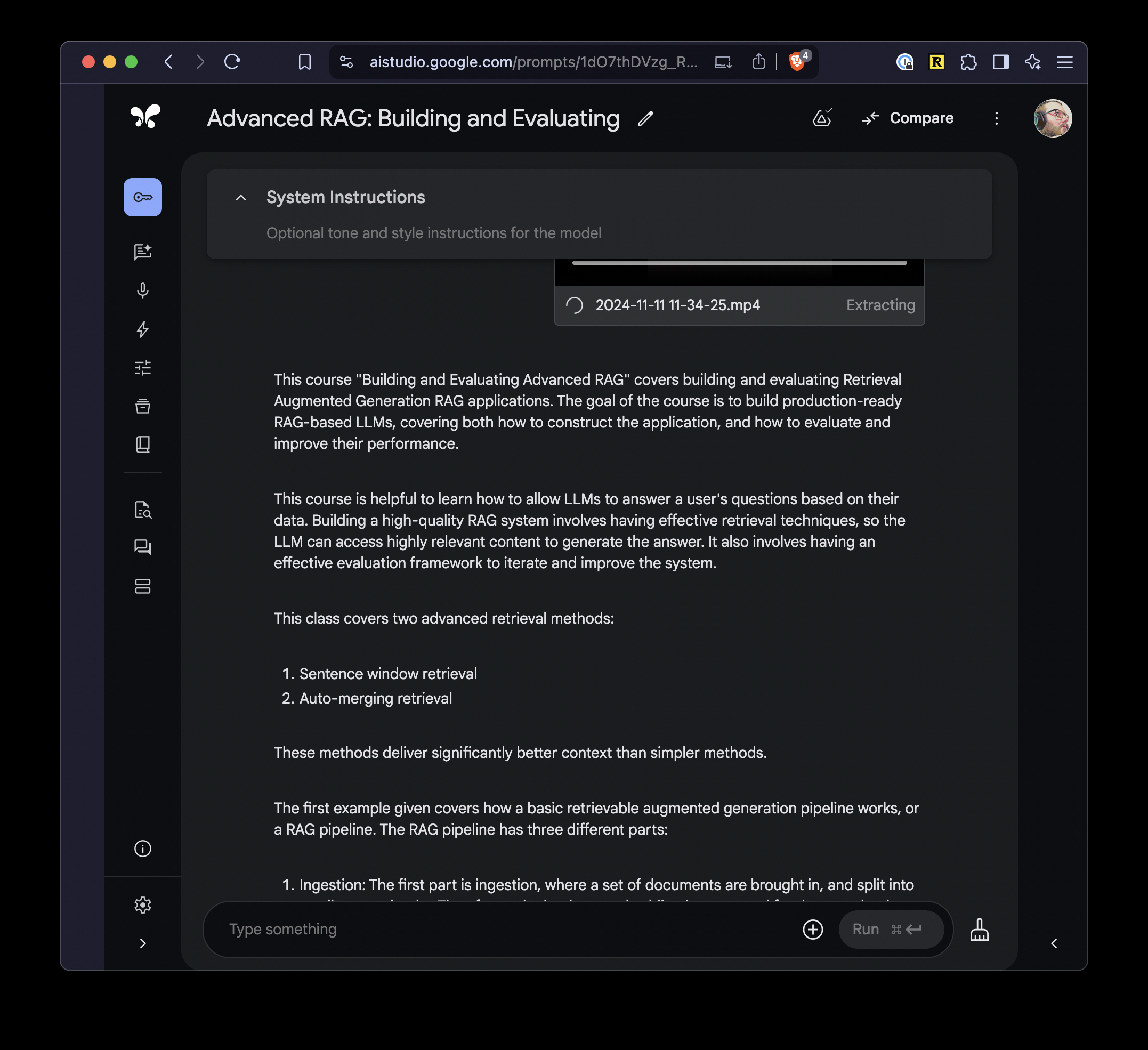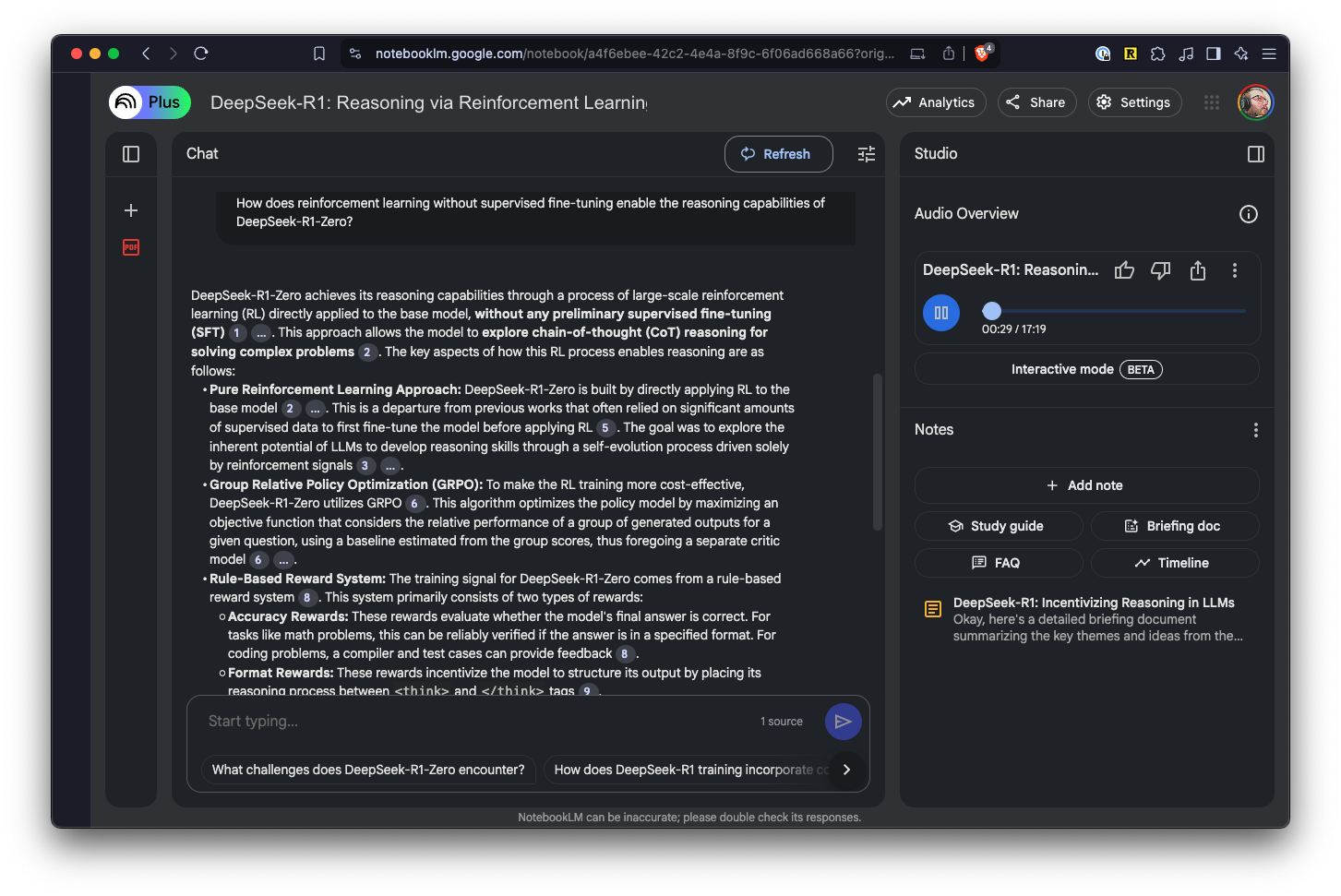In The Age Of Learning
TL;DR⌗
We’ve entered a new age of learning where AI, particularly large language models, enables us to absorb knowledge more efficiently than ever before. AI tools can save valuable time through content summarization, serve as personal researchers that work in the background, and create customized learning plans tailored to individual needs. Tools like ChatGPT, Claude, Gemini, and NotebookLM transform learning by making it more accessible, personalized, and engaging. While AI brings challenges like job displacement and resource concerns, rather than resisting this technology, we should learn to harness it effectively. The future promises even more immersive and personalized learning experiences, potentially transforming how we acquire knowledge throughout our lives.
Dawn of a New Age⌗
I believe we’ve now entered a new age of learning, one in which we can absorb knowledge faster than ever before. It’s not simply that the amount of information available has dramatically increased; our capability to process information in ways uniquely tailored to our personal preferences and needs has also advanced significantly. While it may seem we’ve always been heading in this direction, I think the final pieces have only recently fallen into place thanks to breakthroughs in AI—particularly large language models (LLMs).
Throughout my professional career, I’ve consistently identified myself as a lifelong learner. Adopting a learner’s mindset has allowed me to continuously advance, pick up new technologies, and apply them to solve real problems. It has also driven me to work at education-focused companies in the past. Truthfully, those companies always seemed to have the most noble missions, motivating me even when internal challenges arose.
All of this is to say: continuous learning is something I value deeply, and I genuinely believe people should strive to keep learning throughout their entire lives. In fact, we should only truly stop learning when we cease to exist.
Over the past several years, I’ve had the incredible opportunity to build applications leveraging large language models—the very technology at the center of this transformation. Because of this experience, I’m now certain we have all the essential elements in place to empower anyone to learn almost anything—effectively and efficiently. We possess the necessary tools and the capability to sharpen our efforts toward learning in ways never before possible. In this post, I want to share specific tools and strategies I’ve personally used to accelerate my own learning, offering some optimism amidst the recent anxiety and uncertainty around the impact of AI.
Saving Valuable Time⌗
There’s one finite resource every single person has in this world: time. This, in my opinion, is where AI truly shines. If you remember only one thing from this post, I hope it’s this: AI can dramatically save you time, and it’s the most significant benefit I have found with large language models.
Often, despite an internal impulse telling us we must read every word of an article or piece of content, this simply isn’t necessary. In many cases, a concise and accurate summary can suffice, allowing us to move quickly to more important or relevant material. I’ve found large language models, equipped with their excellent understanding of text and context, incredibly effective at summarizing and identifying key points in content. While I’ve personally built simple tools to achieve precisely that, well-known interfaces like ChatGPT and Claude are equally powerful in this regard.

Using AI-generated summaries, I can easily assess if it’s worthwhile to dive deeper into the entire piece immediately or just file away the key points for future reference. Additionally, these models allow us to directly ask follow-up or clarification questions, helping to quickly determine if certain topics are covered and guiding us on whether a deeper reading is necessary. This single approach has saved me countless hours and allowed for quicker awareness of important concepts, current events, and leading research—helping me allocate my valuable time much more effectively.
This strategy isn’t limited only to text documents or PDFs. Video content, such as YouTube videos, can benefit significantly from summarization as well. Google’s Gemini has proven especially effective for summarizing video content, though many other tools using different AI providers offer similar features. Often, I’ll use a model like Gemini to summarize the content of a YouTube video first, quickly determining whether it’s genuinely relevant before committing my time to watch it fully.
Your Personal AI Researcher⌗
The role of AI as a personal researcher has grown increasingly prevalent in recent months. Leading AI models such as Google’s Gemini, OpenAI’s ChatGPT, DeepSeek’s R1, and Perplexity are now capable of performing real-time, in-depth research through integrated search capabilities.
In practice, I’ve established a compelling workflow for exploring new subjects. For initial exploration or quick questions, I’ll often start with Claude Desktop, leveraging MCP services and search integrations (such as Tavily, Brave Search, or Perplexity) for what I consider “light research.” Claude’s quick insights enable me to continue my current task without distraction. Although Claude’s insights may sometimes lack the depth provided by Gemini or OpenAI’s ChatGPT, they’re an excellent first step.
If I find I need deeper content or more extensive research afterward, I will then reach for Gemini or ChatGPT to deliver detailed insights. This process helps me maintain a steady focus without becoming sidetracked by curiosity while I’m already learning something else. To me, allowing AI models to handle supplemental research quietly in the background—while staying actively focused on my primary learning objective—is invaluable.

Along these lines, when learning from videos, I’ll often task an AI model (Gemini Studio works great here) with taking structured notes. This provides me with concise reference points for revisiting material later, without having to rewatch entire videos.
Putting It All Together⌗
So far, we’ve discussed saving time by prioritizing essential content and using AI tools to perform extensive research in the background. Naturally, the next question becomes: How do we now sit down and accelerate the actual learning of all this information we’ve curated?
Many of the same AI tools mentioned earlier can also help us achieve this. Personally, I’ve created numerous customized learning plans and structured guides using AI. These flexible AI-generated plans let you define your learning goals and specify your available time. They’ll then break down complex subjects into manageable and practical steps. Crucially, these plans aren’t static—they can be continuously adjusted as your schedule, understanding, or motivation shift. Imagine being supported by someone infinitely patient, willing, and ready to adapt your learning experience whenever needed. AI gives us exactly that flexibility, personalized for our own unique learning journeys.
A specific tool that I find myself using repeatedly for exactly this purpose is Google’s NotebookLM—a truly undervalued and underrecognized tool. NotebookLM allows you to consolidate research, documents, and even YouTube videos, creating a unified and interactive learning environment.

However, the feature within NotebookLM that truly amazed me at first—and quickly became indispensable—is its ability to generate a podcast from your collected materials. Initially, this sounded a bit gimmicky, but in practice, this feature provides both variety and convenience. Listening to an AI-generated podcast as I simultaneously add questions, take notes, and dig further into topics makes the learning experience richer and genuinely enjoyable. Plus, audio allows multitasking: cooking, exercising, or walking all become opportunities for effortless but meaningful learning. As unusual as it sounds, having NotebookLM transforms dense material into podcasts has totally transformed my learning habits.
The Future⌗
We’ve spent considerable time talking about current tools and workflows that can support your learning journey. However, this is an ever-evolving field, with new products and tools continually emerging that will undoubtedly reshape how we learn. So let’s briefly imagine what the future may hold.
Currently, the world is fascinated with AI-driven “agents” performing tasks for us. It’s easy to envision a dedicated learning agent tirelessly working to provide you with the latest relevant developments on any topic you’re interested in. With such a technology in place, the concept of being a lifelong learner becomes even more attainable. Classes would no longer rely on static, outdated information; instead, they’d be continually refreshed and updated with the latest knowledge—whether it’s the newest version of a software framework, a cutting-edge programming language, or recent groundbreaking discoveries in science, history, and more.
Expanding even further, think about taking the simple-but-effective idea of generating a podcast from your research materials and evolving that into richer, more immersive experiences. Imagine being able to turn your learning materials effortlessly into compelling educational videos, interactive visualizations, or other styles of content explicitly tailored to your learning preferences. We could take this even further by stepping into fully immersive virtual worlds—environments where experiments, historic events, and complicated concepts come alive around us.
Consider studying ancient Rome: Instead of merely reading or watching documentaries, imagine virtually traveling there to explore, guided by an educational narrative as engaging as a popular TV drama, with interactive and immersive components rivaling any modern video game. Powered by AI constantly synthesizing and integrating updated knowledge from the internet, such experiences could present the most current and accurate information available.
Clearly, becoming fully immersed in virtual learning worlds is something that requires time. Yet, what if every addictive but ultimately unproductive app on your smartphone could be replaced—or at least supplemented—with apps fine-tuned to your personal interests, providing knowledge in the exact bite-sized portions and formats you prefer? Imagine using the time you’d normally spend doom-scrolling through social media instead productively exploring subjects you’re truly passionate about.
We’re approaching a future where learning environments, content, and delivery are more dynamic, personalized, and engaging than ever before. Tools that continually offer updated information, customized precisely to our personal interests, preferences, and chosen learning styles, could unlock unprecedented depth and speed in our lifelong learning journeys.
Conclusion⌗
Despite my clear enthusiasm for AI-supported learning, we must acknowledge that AI also brings consequences. Recent job displacement, significant resource usage, and concerns about intellectual property and copyright infringement are very real issues. Clearly, the situation isn’t purely positive, and mindful consideration is essential.
Nevertheless, AI development won’t stop. Rather than resist its inevitability, it’s essential to understand, adapt, and gain the skills needed to harness this powerful technology effectively. Much like the early days of the internet, when information became exponentially more accessible and learning accelerated dramatically, we again stand on the threshold of a fundamental shift. Instead of turning away from anxiety or fear, we must strive to embrace AI’s potential as powerful supportive agents for personal growth and lifelong learning.
I’ll finish with a final thought—a question that often creeps into my mind these days: how long before we no longer need to actively learn because AI systems can eventually do everything for us? What would that world look like, and would learning itself still hold a meaningful place?